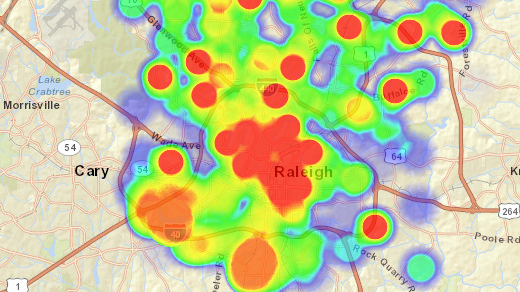One of the keys to a successful open data portal is to make it useful for the end user. Citizens and developers should be able to understand data sets without needing a PhD. I've been following the progress of Raleigh, North Carolina's open data initiative, which launched a beta of their data.raleighnc.gov portal in March 2013.
One of the most important parts of Raleigh's open data initiative is that it's not just about the data. The City staff working on the data policy and the open data portal have a full and complete understanding that presenting raw data sets only gets you halfway to your open data mission. Without visualization tools or a way for the average person to understand what the data means, the job is only half done. They also understand that providing the right data sets can help spur innovation and create new businesses—which is why they are spending a lot of time trying to understand which data is most important to the Raleigh community.
Behind the scenes, there is a champion leading the effort. An open data guru and a hero to many of us on the open government frontlines. Jason Hare is the Open Data Program Manager from the City of Raleigh Information Technology department. I asked Hare to share his thoughts and to give us a better understanding of how the city is defining open data and what the future holds for Raleigh's open data platform. He provided some great insight for Raleigh's up-and-coming open data initiative.
Q: How do you define open data?
A: Open data is the information infrastructure of the City of Raleigh. When we say "data as infrastructure" we are referring to open data.
Open data, open government, and the freedom of information laws are related and have overlap, but are not the same thing. Open data follows cultural, ethical, and technical rules. Ultimately, open data is defined as data sets created by a government entity and made available to the public. The data sets that are released follow the Open Knowledge Foundation (OKFN) guidelines that govern the machine readability, structural issues, and ethical issues of the data released. Our resolution is based on the OKFN guidelines.
Q: Why is it important that the City of Raleigh hired an open data manager?
A: The City of Raleigh wanted an open data manager to ensure that the open data program is developed in a way that is sustainable, transparent, and accessible. Having an open data manager demonstrates Raleigh's commitment to the idea of "open" in regards to data-driven policy development and community engagement.
Q: What is your vision for Raleigh's open data platform?
A: I am developing a white paper on that topic. The short answer is open data is the start of an acculturation process leading to a transparent and collaborative relationship between city government and citizens.
Open data is a necessary but not sufficient effort in that acculturation process. Open Raleigh, as a brand, will emphasize data accessibility and information usability. We are not tying ourselves to a particular technology. We are building an infrastructure using several technologies to deliver information that is the narrative of the city.
Q: What's the difference between providing an open data set and providing useful open data with visualization?
A: There is no transparency without data usability. Tabular rows of numbers and machine readable formats of GIS shape data and CSV's of budget numbers are going to be there for those that want to analyze the raw data themselves. For the other 99% of the rest of us, there will be visualizations that explain the numbers.
Q: How can Raleigh be a leader in the open data space?
A: We build on the work of the pioneers of the open data community and take lessons learned. I have spoken with most of the leaders within the open data community, with several citizen groups within Raleigh, and most of the city government leaders. We will adhere to the emerging global data standard and the ethical standards of open data as put forth by the OKFN.
We are developing our own principles that match the culture of our city. Open Raleigh will be different than most North American efforts. We are emphasizing engagement and interactivity with our data. It is important to me that the citizen experience is visually compelling and informative. Health, culture, law, economics, science, and education will all be open topics. Anything that affects the quality of life of our citizens will be reflected in the data we share through Open Raleigh.
None of this happens overnight. We start with the infrastructure and build out. This will be an iterative experience. The open data manager will not be the final arbitrator of what Open Raleigh becomes. It will be the citizens and City working together in governance over Open Raleigh.
My job is to facilitate and make the experience a positive one for our citizens.
Note: The Open Knowledge Foundation is looking for case studies showing the benefits of open research data. Be sure to contribute your case study to the Open Research Data Handbook – Call for case Studies and collaborate with the volunteer-led guide for Open Research Data best practices.





3 Comments